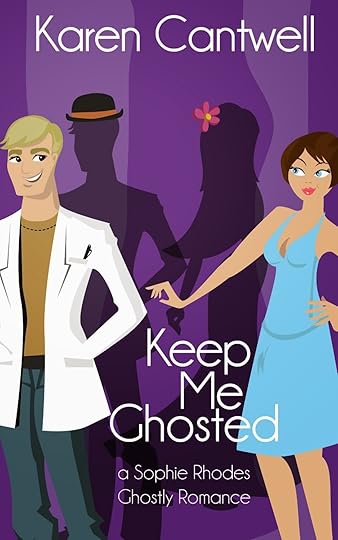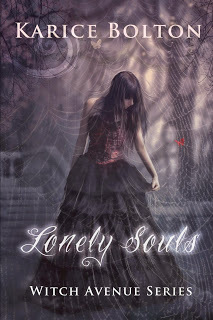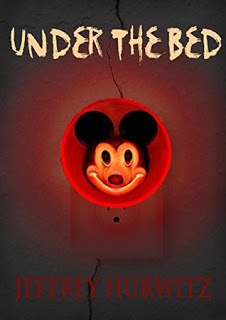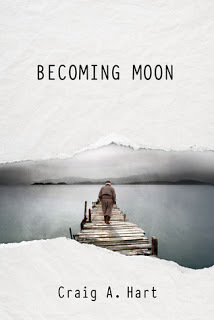Sandra C. Lopez's Blog, page 376
October 27, 2015
Review: KEEP ME GHOSTED by Karen Cantwell
 Sophie Rhodes has a spirit friend A.K.A. a ghost on her shoulder. She goes to a job interview and realizes her new boss has one too. So they both have ghosts? Initially, I thought this was a lame concept. Talking to ghosts? C’mon! Although it would be cool to walk through walls.
Sophie Rhodes has a spirit friend A.K.A. a ghost on her shoulder. She goes to a job interview and realizes her new boss has one too. So they both have ghosts? Initially, I thought this was a lame concept. Talking to ghosts? C’mon! Although it would be cool to walk through walls. I thought Sophie was more of a psychic. Was she? And why was it that she and Dr. Callahan can see and talk to ghosts?
I honestly expected more of a psychic mystery. Well, Sophie’s no psychic, but there’s definitely a mystery with Callahan, his ghost, and his office.
Marmaduke (Sophie’s ghost) is a haughty British gentlemen that talks too much; Moonflower (Dr. Callahan’s ghost) doesn’t like Sophie or the potential romance brewing between her and the good doctor. She is the “dark phantom” that can wreck a room with her spirit energy.
With the help of her spirit guide and a spirit medium, Sophie will crack the case.
An okay read with a somewhat alluring mystery.
My rating: 3.5 stars
Published on October 27, 2015 07:29
Review: A TALE OF 3 WITCHES by Christiana Miller and Barbra Annino
 As a huge fan of the TV show, Charmed, it was no big shock to why I wanted to read this book.
As a huge fan of the TV show, Charmed, it was no big shock to why I wanted to read this book. Just like the title suggests, this is a story of 3 witches.
Witch #1: Mara, who has a daughter with a mortal that worries that his baby may be the anti-Christ. Mara can communicate to ghosts, like her Aunt Tillie, the former super witch.
Witch #2: Stacy is a little more reluctant to her witch destiny. According to her grandma, she is “The Seeker.” Unlike Mara, she gets feelings and images of the dead.
Witch #3: Gus, a male witch, who relishes the fun gifts of a warlock.
One day, Tillie receives a letter asking for her help, but since she is dead, she sends Mara in her place. As a tarot reader, Mara sees “chaos and disaster” on this pending trip. Instantly, there is a magical connection between Mara and Stacy. But then the danger comes when a mysterious stranger checks into the B&B. What was Samhain? The Devil? And why was this being stealing souls?
Together, all 3 witches realize that they must banish this evil before it’s too late.
Like Charmed, this book had drama and funny quips, but it was a little less action-packed. I would’ve appreciated it more if we had been more involved in the personal lives of each witch (we hardly heard anything from Gus – it was mostly from the POV of either Mara or Stacy).
Still, it was a nice, quick novel, and it inspires me to continue reading the series.
-Somebody tell Aunt Tillie is dead
-The Thief who Stole Midnight
-Every Witch Way but Wicked
-Opal Fire
My rating: 4 stars
Published on October 27, 2015 05:00
October 26, 2015
Review: A BOO-TIFUL HALLOWEEN by Angela Shori
 A short, little poem about Halloween, this is an adorable children’s book for young toddlers, I’d say. Illustrations are simple and colorful. In fact, the whole thing’s practically a kid’s coloring book. The monsters, it seems, are rendered with a combination of watercolor paint and Crayola.
A short, little poem about Halloween, this is an adorable children’s book for young toddlers, I’d say. Illustrations are simple and colorful. In fact, the whole thing’s practically a kid’s coloring book. The monsters, it seems, are rendered with a combination of watercolor paint and Crayola. It’s sweet, not scary—just perfect for babies. An okay first book.
My rating: 3 stars
Published on October 26, 2015 07:55
Review: LONELY SOULS by Karice Bolton
 With her pending coronation into the witch coven on the way, suddenly it seemed that life was never going to be the same for Triss, especially with her mother gone missing.
With her pending coronation into the witch coven on the way, suddenly it seemed that life was never going to be the same for Triss, especially with her mother gone missing. Then a creature appears before her? A lost soul? "The lonely souls have been summoned?" What does that mean?
Story has the natural type of magic with the knowledge of plants and herbs utilized within. It was an insipid story with a gradual pace leading up to a mystery of "lonely souls," which doesn't concern the reader as much as it should. It was mostly Triss talking to her friends and how she can't afford to have feelings for Logan, who seems more like a cousin than anything else.
Story is about wiccan folklore and the history of black magic. Well, let me tell you, there's not much "magic" happening in this book.
My rating: 2 stars
Published on October 26, 2015 07:30
Review: SCARY MARY by S.A. Hunter
 Mary is your average, gloomy high school girl, except for one thing: she can hear ghosts, which was a skill that has been bestowed upon her ever since she was born. All the kids at school tease Mary for being “the freak,” and, like in the movie Carrie, she tries to get back at her tormentors with her creepy, gothic attitude. When asked if she was a witch, she’d play along by saying that the coven would meet in the graveyard on BYOB (Bring Your Own Blood) night. In summation, she is the most frightening kid in school—hence, the name, Scary Mary.
Mary is your average, gloomy high school girl, except for one thing: she can hear ghosts, which was a skill that has been bestowed upon her ever since she was born. All the kids at school tease Mary for being “the freak,” and, like in the movie Carrie, she tries to get back at her tormentors with her creepy, gothic attitude. When asked if she was a witch, she’d play along by saying that the coven would meet in the graveyard on BYOB (Bring Your Own Blood) night. In summation, she is the most frightening kid in school—hence, the name, Scary Mary. I loved how Mary would freak out the people at school with her “witchy” powers. She was this shy, sarcastic, unique outcast—she was my kind of girl. Rachel was sort of like a sidekick that was fascinated with this voodoo stuff, which made her a terrific friend to have. I couldn’t stand that Vicky, who was the mean, popular cheerleader we all love to hate. But why was Cy, the new boy, so fascinated with Mary? No boy ever liked Mary as she wasn’t Susie High School. If I were her, I’d do anything to turn him off, too. But he was just so funny and cute, and I loved how he always chose Mary over Vicky.
One day, Mary was over at Cy’s house, where “she absorbed the normality” of his life (548,) and suddenly heard a mysterious voice—a ghost. After a frightful incident with a Ouija board, Mary discovered how dangerous the spirit was. Now, it was up to her to get rid of it before he could hurt someone.
A good YA novel filled with paranormal mystery and intrigue. The writing was okay, but I felt that some sentences could’ve been merged together for better flow and fewer repetitions. And, although the cover doesn’t entirely lend to “horror and gruesome” with the sinister girl set against a dark background, it’s a cute and funny story; it was almost like reading a Goosebumps books.
Note to self: Add sequel to TBR list - Stalking Shadows My rating: 4 stars
Published on October 26, 2015 05:00
October 19, 2015
Review: UNDER THE BED by Jeffrey Hurwitz
 18-year old Jack Cross is a scared, little boy trapped in a quarterback's body. Every night he goes to bed and every morning he wakes up with a mask of horror, surrounded by the bloody remnants of a decaying man. Whoa, talk about some freaky sh#t!
18-year old Jack Cross is a scared, little boy trapped in a quarterback's body. Every night he goes to bed and every morning he wakes up with a mask of horror, surrounded by the bloody remnants of a decaying man. Whoa, talk about some freaky sh#t! What starts off as a compelling and psychotic rendition of Linda Blair on The Exorcist soon turns into a twisted and ambiguous story line. Was Jack a vampire? Was his bed-wetting issue part of his transition as a young boy? And what's all this about seeping into a dark underworld under the bed? Weird.
The element of the Mickey Mouse nightlight was both comforting and unsettling, for Mickey, "usually a symbol of good and fun" is still "a mere rat, savage and primitive." (20) I wouldn't be able to sleep either if I thought Mickey was trying to eat me. But was he trying to eat him, thus turning him into this flesh-eating beast? I don't get it.
Although the words were full of gaudy horror, the story was quite vague. It seemed that Jack was this self-made monster with an obsessive fear and repressed childhood issues. He really needed therapy actually.
I'd like to say that this would be a decent, scary story for teens, like those Goosebump books I used to read, but I just felt that there were too many holes in it, which could be translated to mystery, but, in this case, they were black nothings of confusion.
My rating: 2.5 stars
Published on October 19, 2015 07:57
October 13, 2015
Review: 1979 by Steve Anderson
 In this collection of short stories, Steven Anderson takes you on a ride through 1979.
In this collection of short stories, Steven Anderson takes you on a ride through 1979. In "Garage Wine," a couple of teens take a crack at booze-making.
A side-burned stranger regales a little girl with tales of his boyhood in "Melvin."
With elements like railroad tracks, mill yards, and rafts, I wondered what part of the country these stories were taking place. Was it Kansas or something?
I liked how the Southern, country-style dialogue was rendered in true, raw form, similar to what you'd find in classics like Of Mice and Men or Huckleberry Finn. Although the stories capture that Old Towne ambiance (this was 1979, but it felt more like 1879,) they were also somewhat average, long, and full of history. You'll actually feel like your grandpa is talking to you.
Coming from the 80's I couldn't really relate to this book. But if this was what 1979 was like, then "Wake me up before you Go-Go."
My rating: 2.5 stars
Published on October 13, 2015 08:09
October 9, 2015
Review: BECOMING MOON by Craig A. Hart
 "There was something about writing in the same place every day that turned task to chore. It stunted the imagination. It dampened the enthusiasm. It blunted the honed edge of my prose. I found repetition distracting and, in the throes of boredom, became a master of avoidance. At those times I was much better at not writing, becoming intensely productive in all things unrelated." (3)
"There was something about writing in the same place every day that turned task to chore. It stunted the imagination. It dampened the enthusiasm. It blunted the honed edge of my prose. I found repetition distracting and, in the throes of boredom, became a master of avoidance. At those times I was much better at not writing, becoming intensely productive in all things unrelated." (3)So our aspiring, young writer hits the road, where he encounters Nigel Moon, bestselling author. The writer seeks out this author in hopes that his experience and wisdom would rub off.
"The life of a starving artist is only romantic on the big screen or the printed page. I lived it and quickly discovered I didn’t enjoy suffering for my art. Didn’t mean I loved it less; just that I was more materialistic than I thought." (12)
"We’re a strange breed. I don’t trust naturally happy, well-adjusted writers. I’ve never met an artist enamored with life. I don’t think the two can coexist." (13)
At this point, I have to say that I am awestruck by Nigel Moon. He appears to be standoffish and ill-tempered. In fact, you probably wouldn't think of him as a bestselling author. But what sets him apart are his words, words full of candid reverence, words so brutal yet lovely.
"Artists tend to be crap at business." (14) Yeah, that's true.
"My art has become my nemesis. Because of the goddamn dollar.” (15)
It's hard to say what the writer felt after meeting Moon, especially after that Hemmingway parable (God, did he really shoot himself because he couldn't come up with anything?) but, nevertheless, he continues on with his mission to "begin writing...or, at least, begin the attempts at writing." But what happens when a once-brilliant writer now devoid of words asks you to write the final book in his contract?
In part two, the writer talks of becoming an atheist as a young boy in his sorely religious town, where his father was the pastor. Rewinding in time, the boy relives days of his childhood, reminiscing on his resentment for God, the church, and his father. The reader will enjoy the boy's foolish mischief driven by his wild-eye naiveté in the presence of a holy town.
"If your past experiences, even one of them, had been different, you'd be a different person. Perhaps only slightly different, but different." (113)
Well-written, engaging, and completely relatable, Becoming the Moon is a tantalizing tale of desolated loss and strenuous yearning. As artists, we crave the written word and dream of literary excellence without the compromise of prideful integrity. It is a true portrayal of an artist's passion ruminative in sorrowful and intellectual prose. Story is about a struggle, a struggle at seeking out what was lost or never had; it is a test of ethics and survival of a true work of art in the face of "the system."
"We artists are nothing; it is the art. We are only conduits. When the artist becomes the art, the art itself dies." (143)
"The world owes the artist nothing...the artist is the one who owes the world." (150)
My rating: 5 stars
Published on October 09, 2015 07:24
October 7, 2015
Review: EBENEZER SCROOGE: GHOST HUNTER by Charles Dickens and Jaqueline Kyle
 Ebenezer Scrooge: Ghost Hunter expands the original text of Charles Dicken’s classic with all-new scenes of malicious ghosts, soul devouring wraiths, deadly doppelgangers and other terrors from the netherworld. Our story opens seven years after Marley’s violent death. Ebenezer Scrooge has given up ghost hunting and embraced an inevitable slow death by alcohol poisoning. When the spectre of his deceased partner appears to him on Christmas Eve, Scrooge learns that he must face three Ghosts – one who will try to help him, one who will try to harm him and one that cannot be killed.
Ebenezer Scrooge: Ghost Hunter expands the original text of Charles Dicken’s classic with all-new scenes of malicious ghosts, soul devouring wraiths, deadly doppelgangers and other terrors from the netherworld. Our story opens seven years after Marley’s violent death. Ebenezer Scrooge has given up ghost hunting and embraced an inevitable slow death by alcohol poisoning. When the spectre of his deceased partner appears to him on Christmas Eve, Scrooge learns that he must face three Ghosts – one who will try to help him, one who will try to harm him and one that cannot be killed. In a story that spans a lifetime of torment, Scrooge must face the demons of his past and his failures in the present in order to prevent the horror that is his future. The stakes for Scrooge’s soul have never been higher than in this wicked retelling of the classic, A Christmas Carol.
My thoughts: We've all heard the classic of Dickens' A Christmas Carol, and this book seemed to have an interesting twist. Scrooge, a ghost hunter? That was new.
Of course, Scrooge was still the misanthropic curmudgeon who despises Christmas, keeping uniform of the Dickens tale. Even the language followed suit.
However, story started off a bit slow and it took me a while to understand the context. What began as vaguely nondescript eventually turns into an Old Fashion ghost story--a languid, convoluted ghost story.
The book had an interesting concept, but I just feel that the story drawled on too much to gain any interest. A solid good effort, but not my cup of tea.
My rating: 2 stars
Published on October 07, 2015 00:30
October 5, 2015
Review: THE HAUNT by L. Marshall James
 Strange, annoying phone calls have been happening a lot lately for Brad. When he picks it up, there’s no answer. Just silence.
Strange, annoying phone calls have been happening a lot lately for Brad. When he picks it up, there’s no answer. Just silence. For a short story, it just took forever to get to the nitty gritty, the essential meat of it all. It mainly centered on this good-for-nothing redneck spending all his time drinking beer and fixing his truck. When was the ghost coming? Of course, there has to be a ghost. What else haunts people?
Although the ending was the best part, it still felt rather lukewarm to me. This is an okay story for a quick 5-minute read.
My rating: 3 stars
Published on October 05, 2015 07:28



